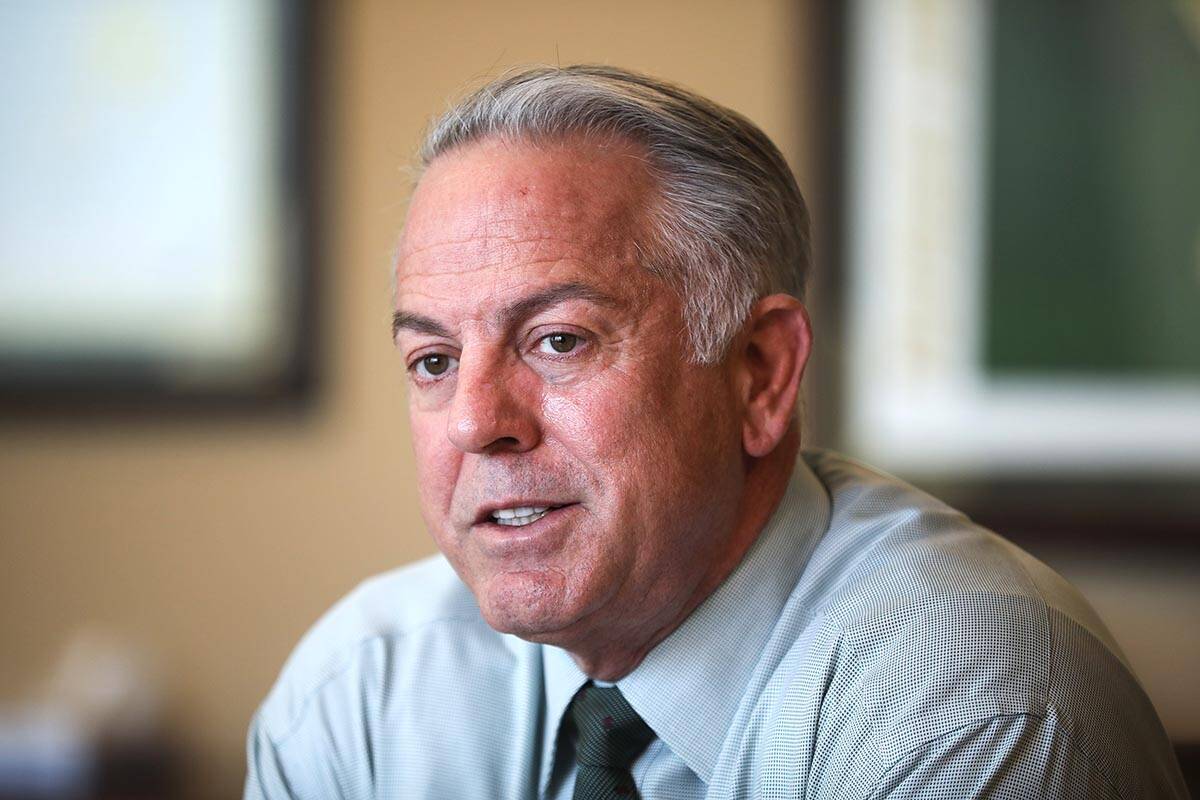Metro lawyers say Lombardo’s political emails should not be public
Clark County Sheriff Joe Lombardo sent emails to his political consultants using a department cellphone, but those records are not public and should not be disclosed, attorneys for the Metropolitan Police Department argued.
The acknowledgment came in motions filed to fight a public records request filed on June 10, just before the primary election, by Due Diligence Group LLC, which has made more than 60 requests of the department for public records related to Lombardo’s tenure as sheriff.
Attorneys with the department’s private law firm Marquis Aurbach argued that there is no law that expressly prohibits Lombardo from “de minimus contact with his campaign” using government time or equipment. And because the emails in question don’t concern the provision of public services, they aren’t public records that need to be disclosed under the law, his attorneys argued.
“By the very nature of the request, and Due Diligence Group’s own acknowledgment, the records it seeks are limited to Sheriff Lombardo’s run for governor,” attorneys Craig R. Anderson and Jackie V. Nichols wrote. “The email communications do not pertain to other employees or officials in (the department) but are strictly limited to Sheriff Lombardo’s campaign” for governor.
But attorneys for Due Diligence noted that a handful of emails the department did release show that Lombardo wrote to his consultants about a citizen complaint about the fingerprint bureau, as well as the success of a vaccine lottery, matters clearly related to providing public services.
“It would thoroughly undermine the purpose of the (public records law’s) central goal of transparency to governmental affairs if the government could claim that records are exempt from disclosure because they involved conduct by governmental officials that violate ethical or legal requirements of persons in that position,” attorney Bradley Schrager wrote. “And the emails themselves indicate that is precisely what was happening.”
He added: “If Sheriff Lombardo failed to keep his public duties and private interests separate when he used government time and resources to confer with his campaign consultants in an attempt to secure an elected, paid position, that in and of itself involves the provision of public services – albeit in an abusive and potentially unlawful manner.”
Personal not public
But Lombardo’s attorneys point to a 2011 case involving the Reno Gazette-Journal, which requested dozens of emails sent on state-issued equipment by former Gov. Jim Gibbons. The court in that case filtered out emails that had nothing to do with state business and were purely personal.
“The issue there was whether then Governor Gibbons emails, including personal and transitory emails unrelated to the provision of public service, were subject to the (public records law),” the department’s attorneys wrote. “There, the district court determined that of the 98 of the 104 emails were not subject to disclosure for various reasons. … It implicitly recognized that the personal nature of the emails would be a sufficient basis for withholding records.”
They cite a portion of the state’s ethics laws that allows “a limited use of government property, equipment or other facility for personal purposes if” the use doesn’t incur a special charge.
The department’s lawyers also argued that Lombardo is not subject to state actions for on-duty political activity because he’s not a state employee and the Metropolitan Police Department is governed by separate state laws.
But the plaintiffs note that Lombardo and other local officials have a duty to avoid conflicts between their public duties and private interests and cite a state Ethics Commission opinion that “incumbent public officers are not entitled to the advantage of public resources during a campaign for re-election.”
The case had been assigned to Clark County District Judge Adriana Escobar, but Escobar recently recused herself from the matter, which will be assigned to another judge for a hearing.
Augustine, Perkins cases
This is not the first time the use of government time or equipment has caused trouble for a public employee in Nevada.
In 2004, the state Ethics Commission fined then-state Controller Kathy Augustine $15,000 after she admitted to using state equipment, a state computer and state employees to help her 2002 bid for re-election.
Augustine was impeached by the state Assembly during a special session in December 2004 on those three counts, becoming the first state official in state history to be impeached. The state Senate convicted her of misuse of state equipment on a bipartisan 14-7 vote, but declined to remove her from office, opting instead to adopt a censure resolution that was approved 20-0, with then-state Sen. Bob Coffin not voting.
“By engaging in the conduct set forth in Article III of the Articles of Impeachment, Kathy Augustine willfully diverted equipment and facilities for use in her campaign for re-election rather than for the interests of the general public whom she has been elected to serve,” the resolution reads. “That this censure serve as a reminder to all public officers of their duty to uphold the laws of this State, to ensure that their staff understands the political activities which must not be conducted on governmental time and to carry out their service solely for the benefit of the general public whom they have been elected to serve.”
In 2005, an administrative law judge ruled that then-Henderson Police Department Deputy Chief Richard Perkins – who was serving in the Nevada Assembly at the time and mulling a run for governor – did not violate the federal Hatch Act, which prohibits government employees from engaging in political activity on government time.
The Henderson Police Department had created a system whereby Perkins would not oversee the use of federal funds while simultaneously serving in the Legislature, although the federal Office of Special Counsel discounted those efforts and claimed Perkins had broken the law after a citizen complaint in 2002.
But Administrative Law Judge William Kocol ruled instead that the Henderson program complied with the law.
“Instead of discounting these efforts, public employers should be encouraged to devise programs that seek to achieve compliance with the Hatch Act while retaining full constitutional freedoms for state and local employees,” the judge wrote in his ruling.
Perkins – who called the investigation a “witch hunt” – was forced to underwrite the city’s defense after then-Mayor Jim Gibson questioned the expense, and also had to hire his own Washington, D.C., attorney to argue his case.
Contact Steve Sebelius at SSebelius@reviewjournal.com or 702-383-0253. Follow @SteveSebelius on Twitter.























